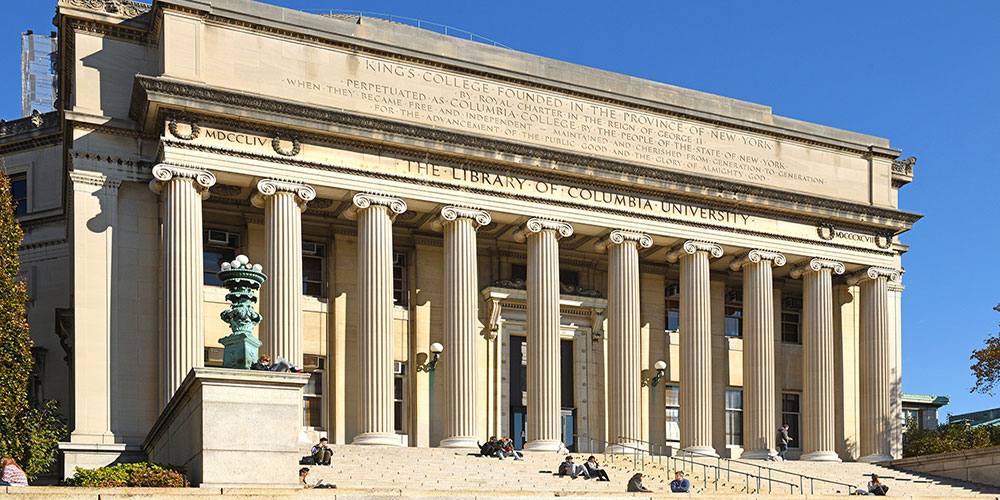ARTICLE UPDATE – AUGUST 15, 2024:
Columbia University President Minouche Shafik announced on Wednesday that she is stepping down, reports CNN. She faced significant criticism over her handling of this spring’s pro-Palestinian protesters and encampments, as well as for her authorizing the arrests of protesters and her testimony to the House Education Committee over Columbia’s handling of allegations of antisemitism.
Katrina Armstrong will be interim president.
ORIGINAL ARTICLE – AUGUST 13, 2024:
NEW YORK — Columbia University announced it has indefinitely restricted campus access to “non-affiliates” in preparation for the start of the 2024-2025 academic year.
Columbia administrators announced over the weekend that starting Monday, the school would move to “orange” status, which only allows students and staff with university ID cards on campus and places limits on entrances and exits, NBC New York reports. Guests will be allowed on campus but must go through a pre-registration process that university officials announced back in June.
Administrators acknowledged the “inconvenience” the limited access will have on students and faculty, noting there are five access points around campus where they can enter 24 hours a day, including:
- College Walk at 116th Street and Broadway
- College Walk at 116th Street and Amsterdam Avenue
- Wien Gate on 116th Street between Amsterdam Avenue and Morningside Drive
- John Jay Gate on 114th Street between Broadway and Amsterdam Avenue
- Northwest Corner Building at 120th Street and Broadway
“This change is intended to keep our community safe given reports of potential disruptions at Columbia and on college campuses across the country as we approach the beginning of the new school year,” Cas Holloway, Columbia University’s chief operating officer, said in a message. “We are particularly concerned about non-affiliates who may not have the best interests of the Columbia community in mind.”
RELATED: UCLA Ordered to Draft Plan to Protect Jewish Students During Israel-Palestine Protests
Columbia Looking to ‘Supplement’ Public Safety Capabilities
The decision to restrict campus access comes after a series of protests last spring, including the April 30 occupation of Hamilton Hall by pro-Palestinian protesters. The protesters barricaded the administration building with furniture and chains. The university called the New York City Police Department for support, and officers used tactical vehicles to enter the barricaded building through windows. Dozens were arrested, including 13 with no affiliation with Columbia. Forty-six people were charged with trespassing but the Manhattan District Attorney’s Office ultimately dismissed cases against 31 people largely due to a lack of evidence.
The school faced criticism over its response to protesters. Some Jewish students and pro-Palestine protesters said they were unfairly treated by the administration. Several Jewish students sued the school for not protecting them from anti-Semitic harassment, while some pro-Palestine protesters said Columbia had pushed an anti-Palestinian narrative.
RELATED: Columbia University Settles with Jewish Student Over Pro-Palestine Protest Security Issues
A university spokesperson told Fox News that the school used the summer to “learn from the lessons of the past academic year and plan for the next one.”
“As part of a consultative process, we are looking at various ways to supplement our public safety capabilities,” said the spokesperson. “We seek to strengthen the department’s skills and training in de-escalation techniques, expanding the department’s ability to manage a range of incidents while taking into account the fact that Columbia does not have its own police force, as many peer institutions have, and potentially reducing our reliance on the NYPD.”
The Wall Street Journal reported the changes could include adding peace officers with arrest powers to the school’s public safety department.
Tensions have remained high at the Ivy League school throughout the summer as demonstrators protest the Israeli counteroffensive in Gaza. Holloway had his Brooklyn home vandalized last week and three university deans recently resigned after anti-Semitic text exchanges were revealed, according to the University Herald.
Columbia’s fall semester starts Sept. 3.













